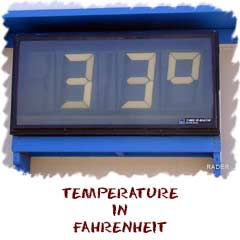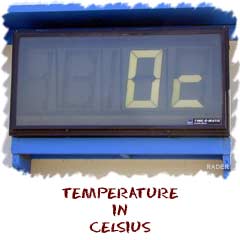Different Scales
 Since we're going to be talking about heat, temperatures, and energy, we wanted to introduce you to how temperature is measured. The big three are Fahrenheit, Celsius and Kelvin. Even though scientists may use only a few scales to measure temperature, there are dozens of types of devices that measure temperatures. All of these devices are called thermometers because they measure temperature. There are thermometers to measure your body temperature, the temperature in your oven, and even the temperature of liquid oxygen.
Since we're going to be talking about heat, temperatures, and energy, we wanted to introduce you to how temperature is measured. The big three are Fahrenheit, Celsius and Kelvin. Even though scientists may use only a few scales to measure temperature, there are dozens of types of devices that measure temperatures. All of these devices are called thermometers because they measure temperature. There are thermometers to measure your body temperature, the temperature in your oven, and even the temperature of liquid oxygen.
Fahrenheit Scale
Fahrenheit is the classic English system of measuring temperatures. Water freezes at 32 degrees Fahrenheit and boils at 212 degrees. The scale was created by Gabriel Daniel Fahrenheit in 1724 and divides the difference between the boiling point and freezing point of water into 180 equal degrees. You will probably be asked to convert temperatures back and forth from Fahrenheit to Celsius. Here's the formula: (Fahrenheit-32)*5/9=Celsius.
Celsius Scale
Celsius is the modern system of measuring temperature. It fits in with much of the metric system and has nice round numbers. Water freezes at 0 degrees Celsius and boils at 100 degrees. The scale used to be known as centigrade but the name was changed several years ago. Both Celsius and Fahrenheit are used when discussing our day-to-day weather temperatures.Kelvin Scale
Kelvin is an important scale used in most of science. The big thing to remember is that this is a scale with no units. It offers more than just giving you degree amounts. The scale begins at 0 (absolute zero) and just goes up from there. Water freezes at the value 273.15 and boils at 373.15 Kelvin. The word "Kelvin" comes from the guy Lord Kelvin who did a lot of work with temperatures.
Or search the sites for a specific topic.
- Overview
- EM Spectrum
- Quanta
- Waves
- Solar Radiation
- Emittance
- Balance
- Global Geometry
- Movement
- Interaction
- Transmission
- Temperature
- More Topics

Projecting Temperature and Precipitation (NASA/GSFC Video)

Useful Reference Materials
Encyclopedia.com:http://www.encyclopedia.com/topic/temperature.aspx
Wikipedia:
http://en.wikipedia.org/wiki/Temperature
Encyclopædia Britannica:
http://www.britannica.com/EBchecked/topic/586581/temperature





